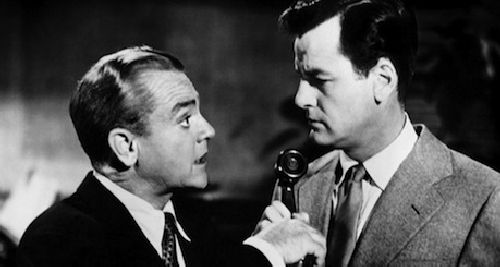Come Fill the Cup (1951) 

Director: Gordon Douglas
Cast: James Cagney, Phyllis Thaxter, Raymond Massey
Synopsis: A recovered alcoholic helps a down-and-out newsman to stop drinking and work his way up to city editor.
Hollywood only started taking alcoholism seriously with the success of Billy Wilder’s The Lost Weekend in 1945, and for some reason it took the industry a long time to realise that ordinary people of little discernible talent were as susceptible to its evils as creative or driven individuals. In The Lost Weekend Don Burnham was an unpublished author, while in Come Fill the Cup, James Cagney (The Roaring Twenties, White Heat) is Lew Marsh, a crusading reporter whose literary sword has been blunted by too much booze. Stepping into the newsroom with the exaggerated care of a drunk trying to appear sober, he delicately negotiates a sea of desks before sitting at his own and beginning to type. He’s got a piece to write about a plane crash in which 40 people died, but what he doesn’t realise is that the tragedy happened five days earlier, on the other side of a massive bender. Burnham lost a weekend, but Marsh somehow lost a whole working week…
Marsh’s subsequent fall from grace is that much steeper than Burnham’s. After being fired by his not entirely unsympathetic editor, Marsh retires to the nearest bar where he philosophises with a bartender over how an alcoholic can always find a reason to have a drink — when’s he down he drinks to drown his sorrows; when he’s up he drinks to celebrate. Marsh’s rejection of colleague and love interest (Phyllis Thaxter) Paula’s offer to take him home — “don’t you understand?” he asks with an air of patient resignation. “I am home.” — precedes a monumental crash which sees Marsh reduced to a stumbling bum, haunting low-rent bars and offering to sweep the floors when he runs out of cash. After begging for loose change from a man on the street, Marsh stumbles into the street, and with a touch of irony which is just a little too heavy, collapses in front of one of the delivery lorries belonging to his former employer.
This incident marks rock bottom for Marsh who, over the professional scepticism of one of the doctors who subsequently dried him out, determines to go on the wagon. He’s helped by Charley (James Gleason), the man who gave him the dime just before he collapsed and who is himself a reformed alcoholic. Charley offers him temporary shelter in his modest flat — ‘just ‘til you get on your feet’ — but five years later, and with Marsh now working as City Editor on The Sun-Herald, the paper from which he was fired, the two men are still flat-mates.
Come Fill the Cup makes an abrupt left-turn at this point in its story, abandoning the study of one man’s battle against a debilitating affliction to become one of the crusading journalist locking horns with powerful gangsters while attempting to help another man give up the juice. This other man is Boyd Copeland (Gig Young — The Hindenburg), the nephew of John Ives (Raymond Massey — Things to Come, East of Eden) the owner of The Sun-Herald. Marsh is a reluctant nursemaid to the ungrateful Boyd, but a tragic incident arising from the younger man’s involvement with the girlfriend of a notorious gangster changes the two men’s relationship in a way that neither could have foreseen.
James Cagney was an actor whose talent was undermined by all those countless imitators endlessly shrugging their shoulders and pushing out their chin with arms outstretched as they breathlessly exclaimed that phrase that he must have come to hate. Unfortunately, those impersonations left a stronger impression on the consciousness of the general public than the performances of the man himself, and Cagney has consequently been sorely under-rated. Compare him, for example, with the veneration in which Bogart, who was a much less assured actor, continues to be held. In Come Fill the Cup, Cagney gives a pleasingly understated performance, allowing the blistering ferocity of which he was capable to burst forth on only one occasion. It’s a choice of delivery that makes believable what might otherwise have been a character too self-confident and driven to convince as a hopeless alcoholic.
Cagney is supported by a strong cast. Gig Young’s performance as the alcoholic, erstwhile composer who hides his despair behind a mask of carefree humour appears lightweight at first, but is given depth by a powerful cold turkey scene which earned him a Supporting Actor nomination. James Gleason also makes the most of a larger-than-usual role as what would today be known as Marsh’s sponsor, while Raymond Massey provides masses of arrogant bluster as the newspaper magnate who seems to be wrong about just about everything. Only Phyllis Thaxter fails to make much of an impression, although that’s largely because her character is a badly under-written old-style female lead who mostly stands around waiting to move in whichever direction she’s pointed by the men in her life.
Apparently, legal restrictions have prevented Come Fill the Cup from gaining a DVD release, and it hasn’t been shown on TV in the US for more than 20 years (although it still shows up on TCM UK on occasion) which means that it hasn’t received the kind of praise it should and has long been overshadowed by The Long Weekend. To be fair, Wilder’s movie is the better, simply because it doesn’t lose focus the way Come Fill the Cup does when it switches from character study to gangster picture. This movie is well worth a look, however, and is an example of the kind of adult drama Hollywood was capable of producing back in the day.
(Reviewed 24th April 2014)
httpv://www.youtube.com/watch?v=xOjgz_zpZHA
